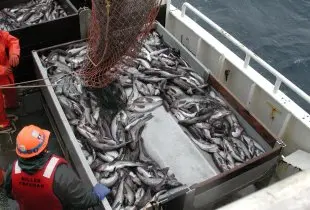Overfishing by foreign vessels is driving many species towards extinction and destroying the livelihoods of fishing communities in countries such as Ghana, Liberia and Mauritania, said the London-based Overseas Development Institute (ODI)
West Africa nations must crack down on foreign fleets fishing illegally off its Atlantic coastline and build up their fisheries to protect the livelihoods of millions of people, a leading thinktank said on 7 September 2016.Corruption and few resources for monitoring fishing mean foreign trawlers often venture into areas near the coast which are reserved for local fishermen, the ODI said in a report. They are exhausting local stocks, often illegally, to the point of forcing local fishermen to go further out to sea to find fish, hugely increasing their costs, according to the ODI.
West Africa could also create hundreds of thousands of jobs if governments invested in the maritime industry, instead of selling off fishing rights to foreign operators, the ODI said."Instead of jobs and development, the livelihoods of local fishers are being decimated by foreign fishing fleets, which operate virtually unchecked," said Alfonso Daniels of the ODI. Mauritania's economy minister in February said overfishing by foreign boats was threatening livelihoods as chronic food insecurity forces a growing number of people into fishing.
At least seven million people work in fishing and fish farming across West and Central Africa, according to the United Nations Food and Agriculture Organization (FAO).
The region loses at least US$1.3bn a year from illegal, unreported and unregulated fishing, said a 2014 report by the Africa Progress Panel, which champions sustainable development.More than half of stocks in the stretch of coast from Senegal to Nigeria have been overfished, with illegal fishing accounting for up to half of the total catch, the ODI said.
Usmane Kpanabum, a fisherman from Sierra Leone, told the ODI that foreign vessels often illegally approach the coast, damage the seabed and destroy the locals' fishing gear.
Around a quarter of all fish landed across Africa are caught by foreign fleets, which generate US$400mn for the continent each year through the sale of fishing rights, the FAO said. African governments could make eight times this amount, some US$3.3bn, and create 300,000 jobs in fishing, if national fleets harvested and exported these fish, the FAO and ODI said.
"Illegal fishing a is difficult issue to tackle, financially and politically," Daniels told the Thomson Reuters Foundation."But if it is addressed, this will create jobs, boost revenues and incentivise young people to stay in the region, which will reduce mass migration and youth unemployment."





